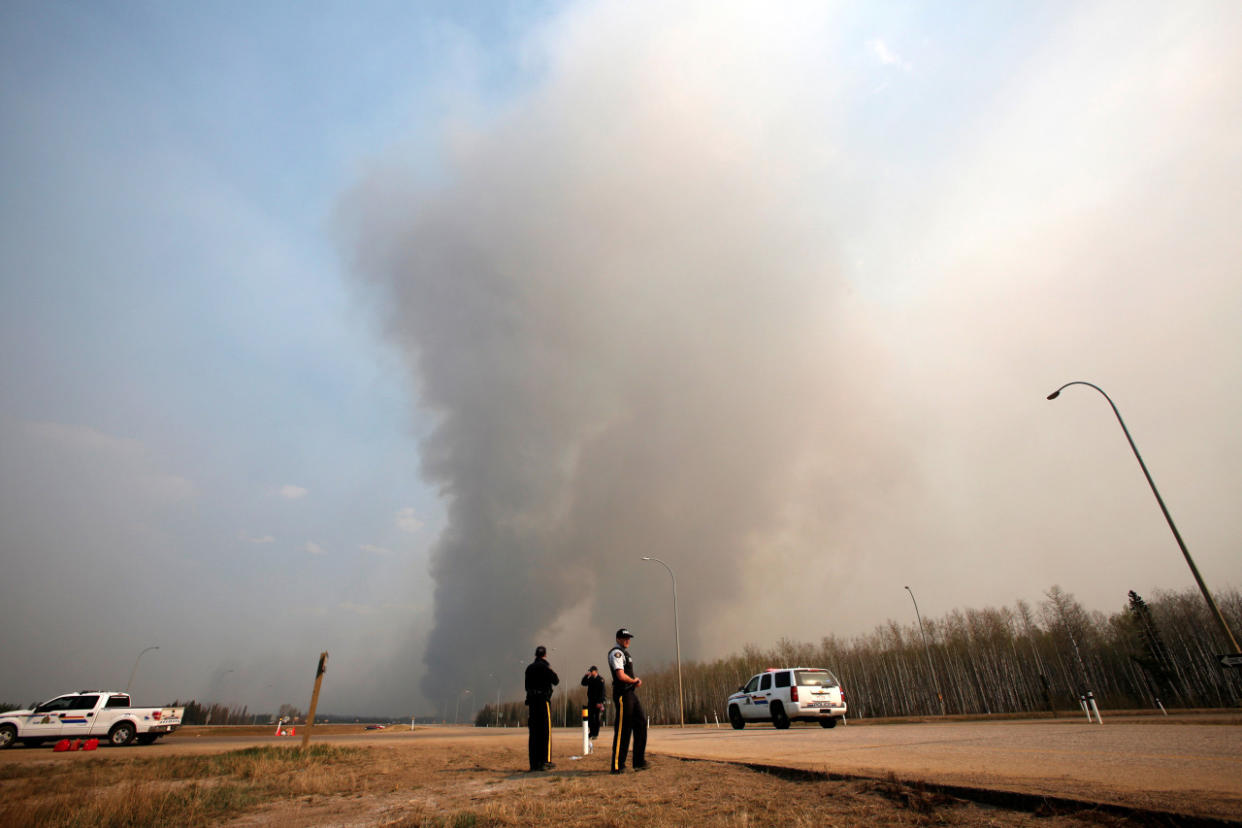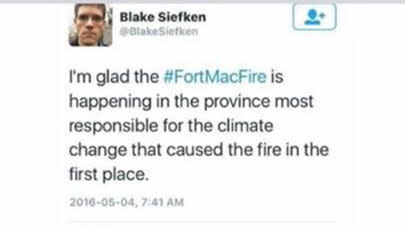 Daily Brew
Daily BrewFort McMurray fire sparks climate change debate

[RCMP officers work at a roadblock as smoke rises from wildfires south of Fort McMurray, Alta., on May 6, 2016. REUTERS/Chris Wattie]
A couple of days ago, as families in Fort McMurray, Alta., were fleeing the devastating fire that continues to consume the area, Blake Siefken took to Twitter.
“I’m glad the #FortMacFire is happening in the province most responsible for the climate change that caused the fire in the first place,” Siefken wrote on Wednesday.
The comment was quickly deleted and he offered an apology but Siefken, an employee of the Vancouver-based entertainment and review program, The Electric Playground, had started a fire of his own.
The social media reaction was swift and Siefken’s employer announced that he had been suspended, his pay for that unspecified amount of time to be donated to Red Cross relief efforts in Fort McMurray.
“Regardless of the intent of his message — which, we believe was truly poor judgment and a mistake — the blatant insensitivity he has shown towards all of the families affected by these awful fires did not sit well with any of us here at EP,” the show’s producers said in a statement.
Neither Siefken nor the show responded to requests for comment.

Former Alberta NDP candidate Tom Moffatt sparked a similar social media storm by calling the fire “karmic” in a now-deleted tweet.
Siefken and Moffatt stumbled, offensively, onto the topic that will rage well after the flames have been extinguished in Fort McMurray.
Is climate change playing a role in the disaster unfolding in the heart of Alberta’s oilsands, Ground Zero for Canadian environmentalists demanding action to end global warming?
Green Party Leader Elizabeth May didn’t hesitate to make the link and articles have appeared in media as far flung as the New Yorker and Motherboard.
John Innes, dean of the University of British Columbia’s forestry faculty and Forest Renewal B.C.’s chair of forest management, would tend to agree. Sort of.
“I believe there is a link but not directly to this particular fire,” Innes told Yahoo Canada News.
Years of scientific modelling have warned of a longer wildfire season with more intense fires as the climate warms.
“Everything we are seeing is consistent with an event like [what] has happened in Fort McMurray,” he said. “We’re also seeing extraordinary conditions across Western Canada.”
The fire danger is already extreme across most of the region, from Manitoba to B.C.
“We are dealing with very, very unusual conditions. We have record temperatures. These are all consistent with climate change,” Innes said.
Add to that the warming effects of the El Nino weather pattern over the Pacific, which led to lower snowfall in northern B.C. and Alberta. The forests are dry.
Unfortunately, this is beginning to look like the new normal, he said.
“Absolutely tragic,” Innes said.
Climate scientists have warned for many years that the instability in the climate due to global warming would increase the frequency of extreme weather events, including drought, fires and floods.
“Climate change during the 21st century is expected to result in more frequent fires in many boreal forests, with severe environmental and economic consequences,” according to Natural Resources Canada.
“Fire-prone conditions are predicted to increase across Canada. This could potentially result in a doubling of the amount of area burned by the end of this century, compared with amounts burned in recent decades.”
Authorities don’t yet know what sparked the fire in Fort McMurray.
For evacuees, the speculation is not helpful.
“No matter what your view are on the oil sands, global warming or even Fort McMurray,” Derrick Lebrun responded to Seifken on Twitter. “People are already going through a tough time with the lack of jobs and now this. No human beings should have to suffer like this.”
The frequency of wildfires is going to increase, Innes warned, but while climate change creates the conditions for flames to spread far and fast, the majority of fires are caused by human activities.
“I think people need to be ever more careful,” he said.
“We could reduce the number of fire starts probably by half if people were more careful in what they do when they’re out in the forest.”



